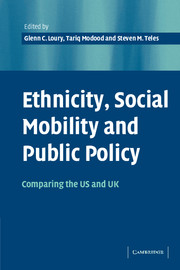Book contents
- Frontmatter
- Contents
- List of figures
- List of tables
- List of contributors
- Acknowledgements
- Introduction
- Part I Historical overviews
- Part II Informal social networks
- Part III Formal structures
- 9 Educational progress for African-Americans and Latinos in the United States from the 1950s to the 1990s: the interaction of ancestry and class
- 10 The educational attainments of ethnic minorities in Britain
- 11 Why America's black–white school achievement gap persists
- 12 Networks and niches: the continuing significance of ethnic connections
- 13 Nonwhite origins, Anglo destinations: immigrants in the USA and Britain
- 14 Social mobility of ethnic minorities
- 15 Ethnic minorities, employment, self-employment, and social mobility in postwar Britain
- Part IV Political institutions and processes
- Part V Normative analysis
- Author index
- Subject index
- References
14 - Social mobility of ethnic minorities
Published online by Cambridge University Press: 22 September 2009
- Frontmatter
- Contents
- List of figures
- List of tables
- List of contributors
- Acknowledgements
- Introduction
- Part I Historical overviews
- Part II Informal social networks
- Part III Formal structures
- 9 Educational progress for African-Americans and Latinos in the United States from the 1950s to the 1990s: the interaction of ancestry and class
- 10 The educational attainments of ethnic minorities in Britain
- 11 Why America's black–white school achievement gap persists
- 12 Networks and niches: the continuing significance of ethnic connections
- 13 Nonwhite origins, Anglo destinations: immigrants in the USA and Britain
- 14 Social mobility of ethnic minorities
- 15 Ethnic minorities, employment, self-employment, and social mobility in postwar Britain
- Part IV Political institutions and processes
- Part V Normative analysis
- Author index
- Subject index
- References
Summary
Introduction
There has been remarkably little research on the social mobility of ethnic minorities in Britain. This contrasts with the huge amount of research on intergenerational social mobility among the native population of Britain (and of other Western societies), focusing in particular on the extent of social reproduction – that is, on the extent to which sons (and more rarely daughters) are able to secure similar positions in the class structure to those held by their fathers. The nature of these intergenerational processes of social mobility and stability are now reasonably well understood. Some of the major findings are that there has been substantial intergenerational continuity, particularly among the petty bourgeoisie and the more privileged groups in the salariat; but that at the same time there have been substantial opportunities for upward mobilility from the working class as a result of increasing “room at the top” (see, for example, Goldthorpe 1987, Heath and Payne 2000).
In an early study, based on data from 1972, Heath and Ridge (1983) looked at the social mobility of the first generation of ethnic minority men who had migrated to Britain in the 1950s and 1960s. They suggested that migration broke the close link that usually obtains between father's and son's class position, and they found that nonwhite migrants and white migrants from the Republic of Ireland were less likely to have been intergenerationally stable, and were more likely to have been downwardly mobile, than the British-born white men.
- Type
- Chapter
- Information
- Ethnicity, Social Mobility, and Public PolicyComparing the USA and UK, pp. 393 - 413Publisher: Cambridge University PressPrint publication year: 2005
References
- 29
- Cited by



